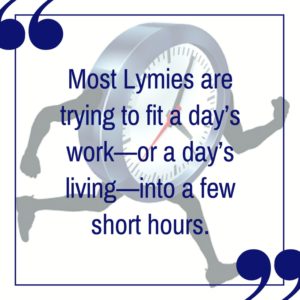by Jennifer Crystal
When I was first sick with Lyme disease, time dragged endlessly.
I lay in bed or on the couch—too neurologically impaired to do “normal” sick-day activities like watch TV or read a book—and listened to the clock tick. I had more time on my hands than most people would know what to do with, but no energy to do anything with it. Time was my enemy, because I was waiting, waiting, waiting for it to pass so I could feel better. It was like watching sand drip one grain at a time through an hourglass, only to flip it over and suffer again through the same long, painful day. The same long, sleepless night. This went on for years.
Now that I am in remission, the hourglass is still my nemesis. Because I am better but not fully cured—the case for most people who suffer with long-term tick–borne illness—I need to allocate judiciously the limited energy I do have. And that tricky hourglass, which once dripped slower than molasses, now seems to flow faster every day.
Sick or healthy, all of us have an hourglass. Everyone has a certain amount of energy to spend each day. In a busy, wired world, we are all running the race against time. Friends often remark to me, “Don’t you feel like time goes faster now that we’re getting older?” or, “Where did the summer go?” Now we’re heading in to fall; with shorter days that will be clipped even tighter when we turn back the clocks in a few weeks. The race is picking up.
For Lymies in any stage of recovery, that race is amplified by the fact that our energy can run out without warning. A patient can be having a good hour—the first in days!—and then, suddenly hit a wall. Doctors use this term because it is akin to the feeling marathon runners get when they suddenly lose steam due to depletion of glycogen in their muscles. Runners can sometimes combat the condition by ingesting carbohydrates; Lyme patients, on the other hand, find themselves slumped in bed. When we’re out of energy, we’re out. We have no reserves.
As I started to feel better, my hourglass became more reliable. It still can run out more quickly than expected, but for the most part, I know how much energy I have and how much time I have to spend it. By my calculations, it’s roughly half the time that able-bodied people get. My energy is best in the mornings. I wake up feeling strong and clear-headed. Morning is my time to write, to teach, to exercise, to go food shopping. Not all in the same morning, mind you. Harkening back to last week’s post, I’m careful to write one morning and exercise the next, leaving the grocery shopping for its own day.
Afternoons are another story. I hit a wall every afternoon around 1:30, and must nap. The rest isn’t optional. Without it, I melt down, making the evening long and cranky and the next day worthless. Naps keep my hourglass dripping steadily, and ensure the fullest glass possible when I flip it over the next day.
To a healthy person working a 40+hour work week, naps probably sound luxurious. Yes, I am lucky to be able to take the time out I need in order to function. But it also means I lose my afternoons. If I don’t meet a morning deadline, I can’t say, “That’s okay—I’ll just finish it this afternoon.” I can read essays or run small errands later in the day, but my major tasks—especially creative work—must be done in the morning.
Whether we’re better in the morning or at night, most Lymies are trying to fit a day’s work—or a day’s living—into a few short hours. This is why we get anxious when dinner plans get shifted an hour later. It’s not because we’ve become demanding and finicky from our illness. It’s because we know the clock is ticking. If I have to be in bed by 10:00 and dinner with friends gets pushed from 7:00 to 8:00, my time with them gets cut short. I’ll probably have to leave early, because the repercussions for pushing my bedtime are severe.
It’s a hard balance, trying to be flexible while living with strict time constraints. I’m grateful to friends and family who accept and accommodate my unusual schedule. If you know a Lymie, please be patient with them. Recognize that they have very little control over their hourglass of energy. If they don’t call you back, or cancel on dinner or cut short your conversation, it’s nothing personal; it just means they’re out of sand.
Time does fly by these days, and I’m just fine with that. It means my years of waiting for time to pass are over. I may not get as much time in a day as a healthy person, but I’m able to use, instead of suffer through, the hours I do get. And that, to me, is a glass half full.
Opinions expressed by contributors are their own.
Jennifer Crystal is a writer and educator in Boston. She is working on a memoir about her journey with chronic tick-borne illness. Jencrystal5678@gmail.com

GLA
Admin at GLA







-2.jpg)